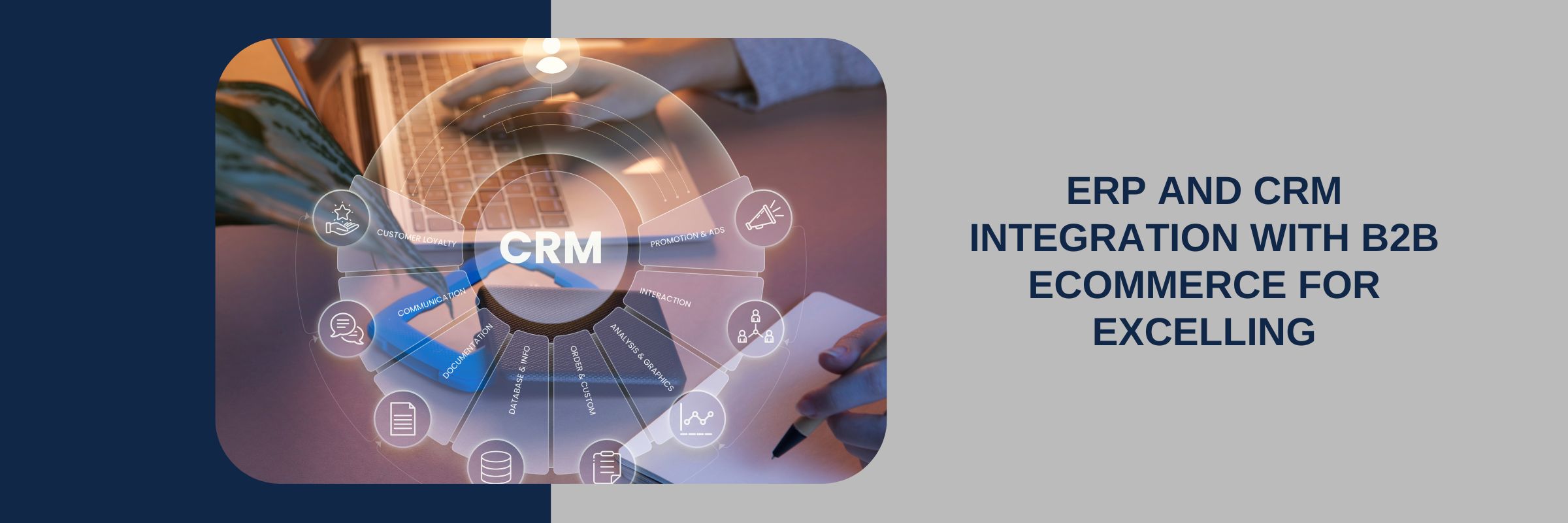
Unlocking Efficiency: Why ERP and CRM Integration is Essential for Your B2B E-Commerce Success
Explore the transformative impact of ERP and CRM integration on B2B eCommerce efficiency, customer satisfaction, and business scalability.
- .

In the intricate web of modern business operations, where every second counts and precision is paramount, integration of systems often separates thriving enterprises from those struggling to keep pace. Consider a B2B e-commerce platform operating in isolation, disconnected from its ERP and CRM systems. This separation could lead to operational inefficiencies, inaccurate data, and missed opportunities, stunting growth and hampering customer satisfaction.
Imagine the impact if every order, customer interaction, and inventory update were seamlessly synchronized across all systems. This is not just a possibility—it’s a game-changing reality achieved through the integration of ERP (Enterprise Resource Planning) and CRM (Customer Relationship Management) systems with your B2B e-commerce app. Such integration transforms complex, disjointed processes into a streamlined, cohesive operation, driving efficiency, accuracy, and strategic decision-making.
In today’s competitive B2B landscape, where every detail matters, integrating your e-commerce platform with ERP and CRM systems is more than a technical enhancement; it’s a strategic imperative. Discover how this integration not only aligns your business operations but also positions you for sustainable growth and enhanced customer engagement.
Why ERP and CRM Integration Matters
1. Streamlined Operations
ERP systems centralize core business processes, including inventory management, order processing, and financial reporting. Integrating these systems with your B2B e-commerce app ensures that data flows seamlessly between the two platforms. For example, when an order is placed online, the integration automatically updates inventory levels, processes the payment, and generates a shipping label—eliminating manual data entry and reducing errors.
2. Enhanced Customer Experience
CRM systems manage customer interactions and relationships. Integration with your e-commerce app allows for real-time synchronization of customer data, providing a comprehensive view of client behaviour and preferences. This integration enables personalized marketing efforts, targeted promotions, and improved customer support. According to a 2023 report by Salesforce, companies with integrated CRM systems see a 29% increase in sales and a 34% increase in customer satisfaction.
3. Improved Data Accuracy and Decision-Making
Disparate systems often lead to discrepancies in data, which can impact decision-making and strategy. Integration ensures that all departments have access to consistent, accurate data. For instance, sales teams can view up-to-date inventory levels and customer purchase history, enabling better forecasting and more informed decisions. A study by Aberdeen Group found that businesses with integrated systems experience a 24% improvement in data accuracy.
4. Efficient Order Fulfillment
Effective order fulfilment requires coordination between various functions, including sales, inventory, and logistics. ERP and CRM integration ensures that order information is accurately captured and processed. This integration allows for real-time tracking of orders, automated notifications, and timely updates to customers. The result is faster, more reliable order fulfilment and higher customer satisfaction.
5. Cost Savings and Increased Efficiency
Manual processes and data duplication can lead to inefficiencies and increased operational costs. Integration reduces the need for manual data entry and minimizes the risk of errors, leading to significant cost savings. According to a report by Forrester Research, businesses that implement ERP and CRM integration can reduce operational costs by up to 20%.
Key Considerations for ERP and CRM Integration
1. Scalability and Flexibility
As your business grows, so do your e-commerce and CRM/ERP needs. When choosing a B2B e-commerce app, ensure it supports scalable integration with your ERP and CRM systems. This flexibility allows you to adapt to changing business requirements and technological advancements.
2. Data Security and Compliance
Integration involves the exchange of sensitive data between systems. It is crucial to ensure that your integration solution adheres to data security and compliance standards. Look for systems that offer robust security features and comply with regulations such as GDPR and CCPA.
3. Seamless Implementation
A successful integration process requires careful planning and execution. Work with experienced vendors who can guide you through the implementation process, ensuring that all systems are effectively connected and functioning as intended.
4. User Training and Support
To maximize the benefits of integration, provide adequate training for your team on the new system functionalities. Ongoing support and updates are also essential to address any issues and keep the integration running smoothly.
Conclusion
Integrating your B2B e-commerce app with ERP and CRM systems is more than a technological upgrade—it’s a strategic move that can significantly enhance operational efficiency, customer satisfaction, and data accuracy. As businesses navigate the complexities of the digital marketplace, seamless integration offers a competitive edge by streamlining processes, improving decision-making, and driving growth.
Embracing ERP and CRM integration is not just about keeping up with technological trends; it’s about positioning your business for long-term success in a dynamic market. Ensure your e-commerce solution is equipped to handle these integrations and unlock the full potential of your operations.
Ready to elevate your B2B e-commerce experience? Explore integrated solutions that streamline operations, enhance customer interactions, and drive business growth.








 06 Apr 2025
06 Apr 2025 8 mins to read
8 mins to read


